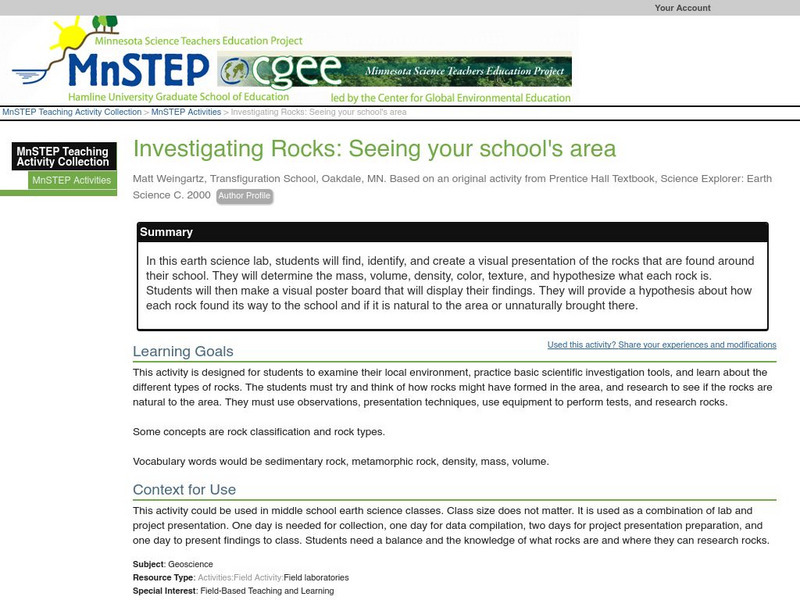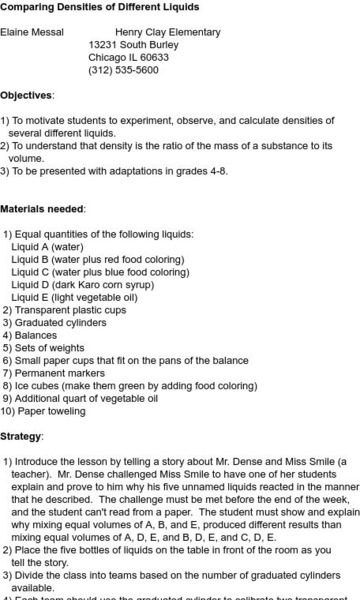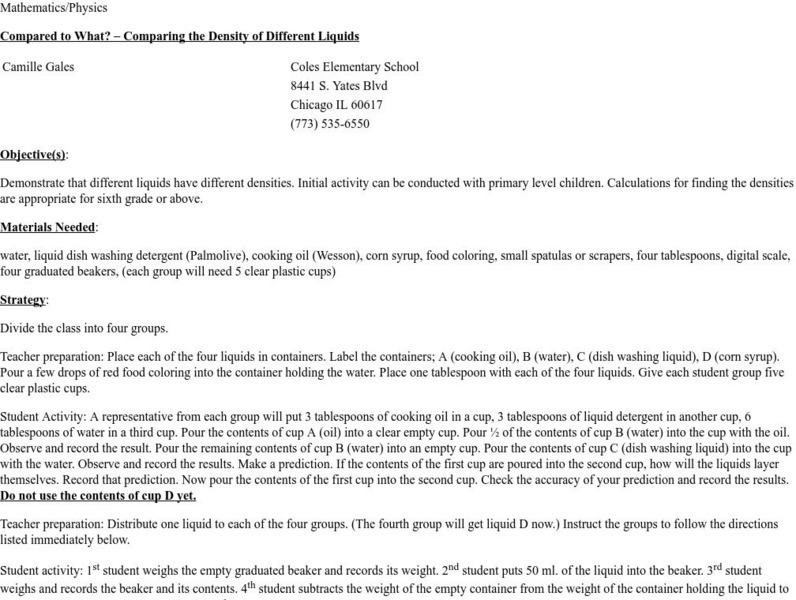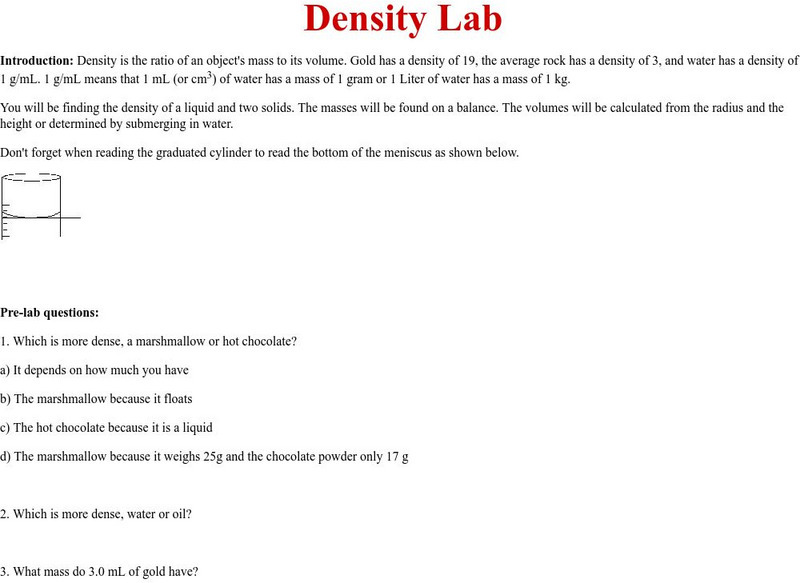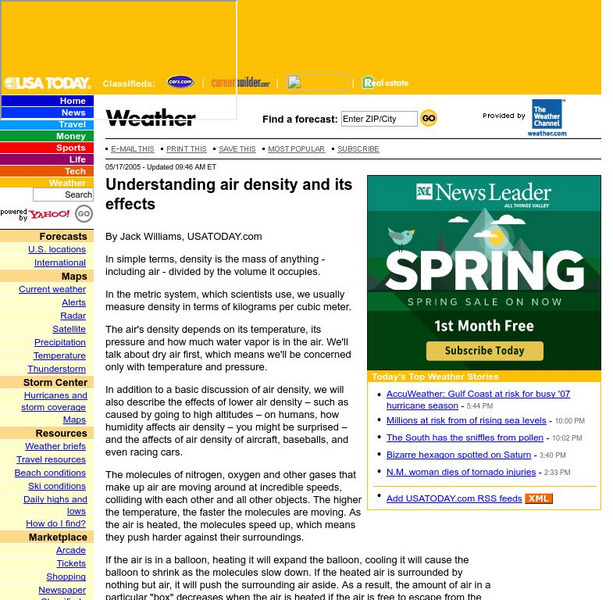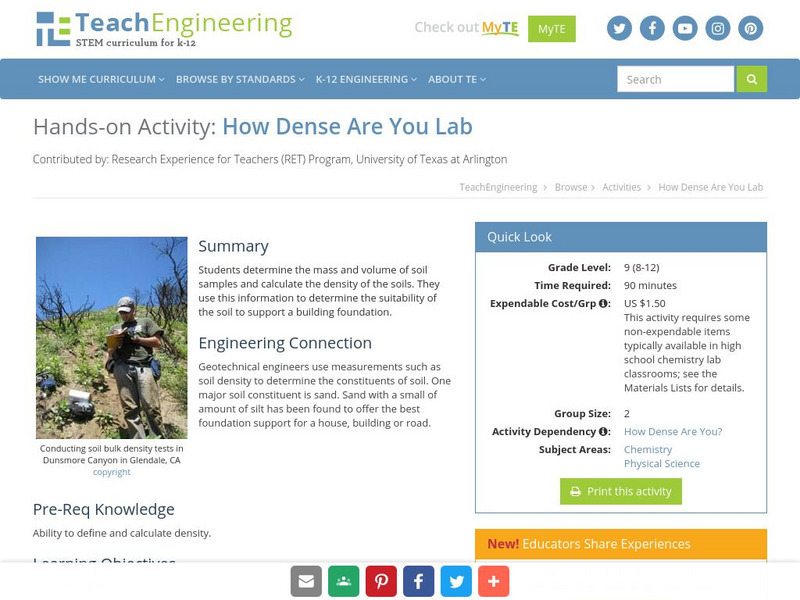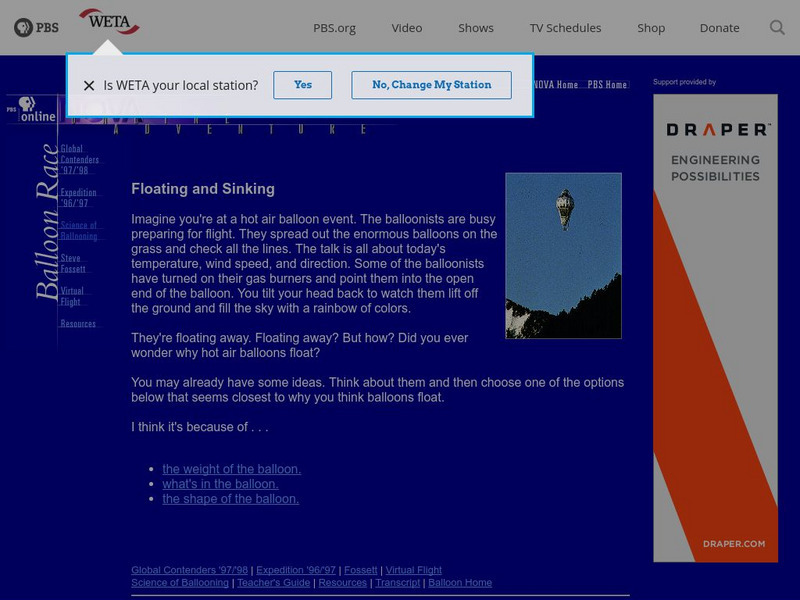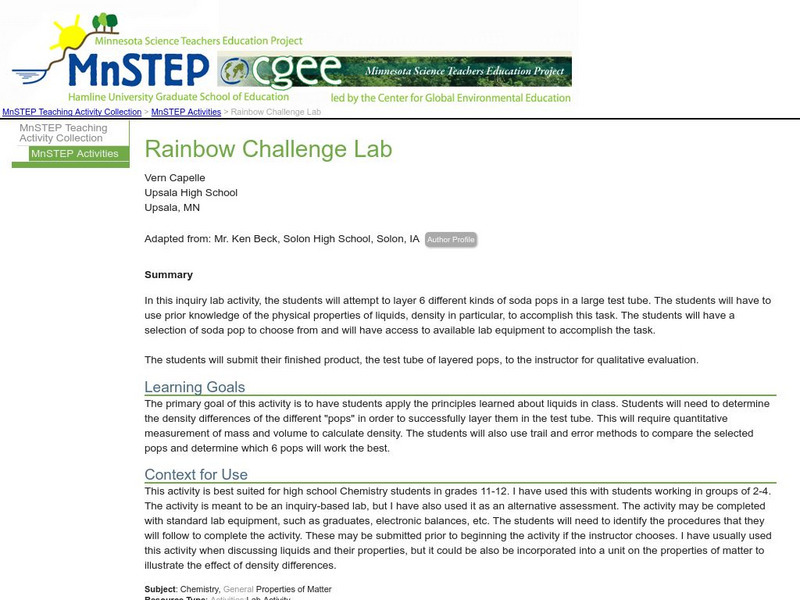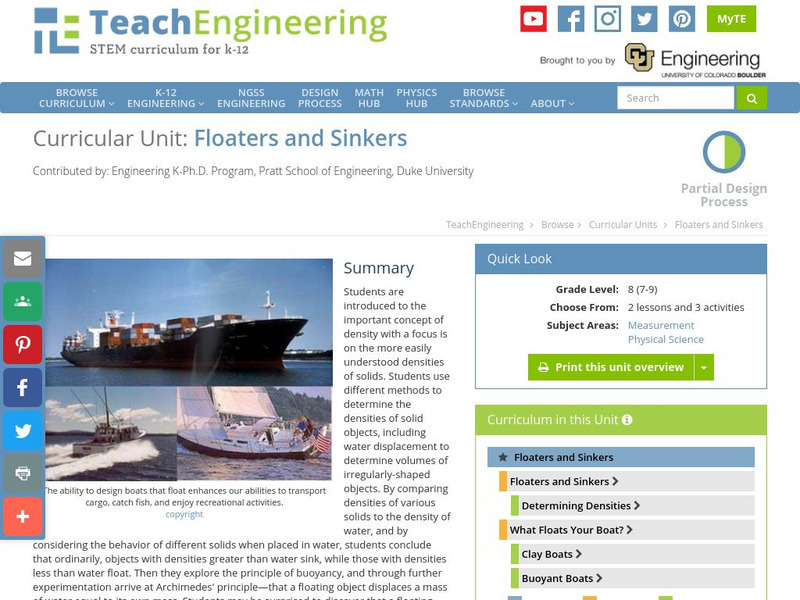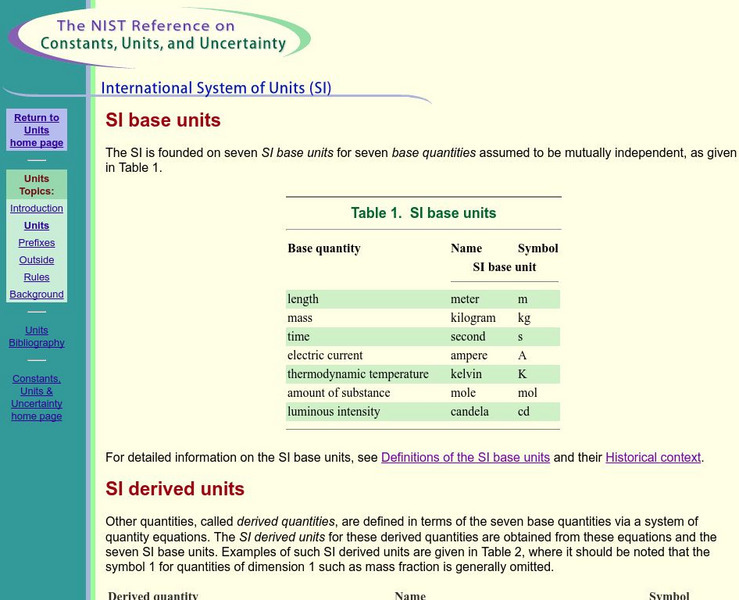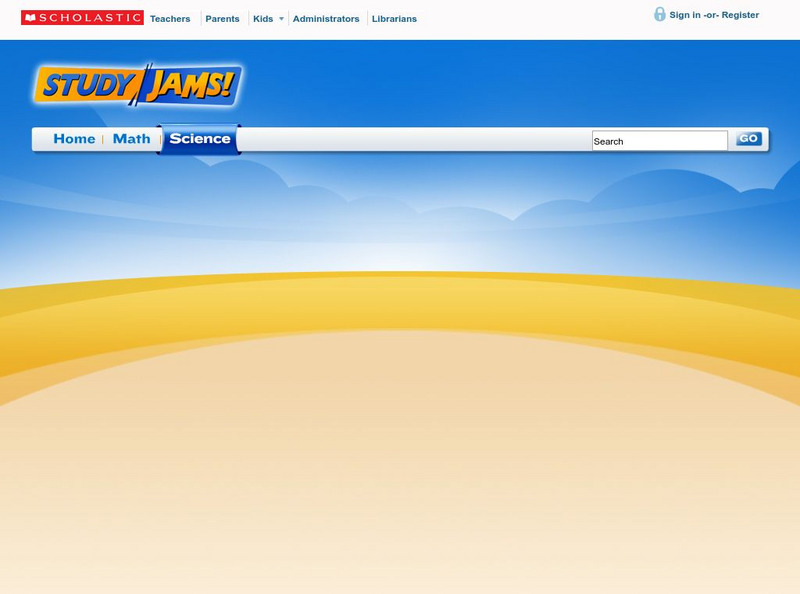California State University
Csudh Project for Chemistry: Mass, Density, and Volume
Use these word problems as a review in the areas of mass, density, and volume.
Science Education Resource Center at Carleton College
Serc: Investigating Rocks: Seeing Your School's Area
In this earth science lab, middle schoolers will find, identify, and create a visual presentation of the rocks that are found around their school. They will determine the mass, volume, density, color, texture, and hypothesize what each...
Science and Mathematics Initiative for Learning Enhancement (SMILE)
Smile: Comparing Densities of Different Liquids
This lab experiment has students observe and compare the density of five different liquids while measuring mass and volume.
Science and Mathematics Initiative for Learning Enhancement (SMILE)
Smile: Comparing Liquid Density
Because different liquids have different properties, density also differs. In this lesson from the Illinois Institute of Technology, students will calculate densities of water, dish-washing detergent, cooking oil, and other liquids.
Other
Lapeer County Schools Science Resources: Density Lab
A simple lab experiment for students to find the density of two solids and a liquid (does not use water displacement). Note that number 1d should not state "weighs" since mass is being found.
USA Today
Usa Today: Understanding Air Density and Its Effects
In simple terms, density is the mass of anything - including air - divided by the volume it occupies. In the metric system, which scientists use, we usually measure density in terms of kilograms per cubic meter. The air's density depends...
Alabama Learning Exchange
Alex: Density
Density is the ratio of mass to volume. Density will be introduced to students by a demonstration of coke verses diet coke. The teacher will then solve density problems for the students on the board. The class will then complete a lab on...
TeachEngineering
Teach Engineering: How Dense Are You Lab
Students determine the mass and volume of soil samples and calculate the density of the soils. They use this information to determine the suitability of the soil to support a building foundation.
PBS
Pbs Learning Media: Floating and Sinking: Hot Air Balloons
Why do hot air balloons float? This resource from the NOVA Web site offers a series of interactive activities that illustrates the physics of hot air balloons.
Illustrative Mathematics
Illustrative Mathematics: G Mg a Ton of Snow
For this task, young scholars are asked to find out how much snow has been shoveled using the concepts of area, depth, density, and rate. Aligns with HSG-MG.A.2.
PBS
Pbs Teachers: Water Density
Demonstrate the effect that dissolving different amounts of salt in water has on the density of the liquid.
Science Education Resource Center at Carleton College
Serc: Rainbow Challenge Lab
In this inquiry lab activity, learners will attempt to layer 6 different kinds of soda pops in a large test tube using their knowledge of density and other physical properties of liquids.
TeachEngineering
Teach Engineering: Floaters and Sinkers
Through this curricular unit, students are introduced to the important concept of density. The focus is on the more easily understood densities of solids, but students may also explore the densities of liquids and gases. Students devise...
Georgia Department of Education
Ga Virtual Learning: Fluids
In this interactive module you will be introduced to a unit on fluid dynamics. Learn how an object's density relates to its mass and volume by completing various activities and interactives.
National Institute of Standards and Technology (NIST)
International System of Units: Si Base Units
This is the definitive source for information on SI base units, derived units, squares, cubes, luminosity, field strength and flux density.
TeachEngineering
Teach Engineering: Attack of the Raging River
In this lesson, the learners will discover the relationship between an object's mass and the amount of space it takes up (its volume). The students will also learn about the concepts of displacement and density.
CK-12 Foundation
Ck 12: Chemistry Simulation: Going Fishing
[Free Registration/Login Required] Students will be able to change the mass and volume of an item and observe if it floats, sinks, or remains at a certain depth in the water. Students will also be able to change the liquid in level 2.
PBS
Pbs Teachers: What's More Dense
Compare the density of water, corn oil and corn syrup by trying to float different items in each material and then putting all three liquids into one container.
Chem4kids
Chem4 Kids: Symbols in Chemical Equations
Chem4Kids! provides an overview of the symbols representing numerical values in chemical equations. Each symbol is defined and described.
American Geosciences Institute
American Geosciences Institute: Wind Classroom Activities
When air is warmed, it expands and becomes less dense. As the air becomes less dense, its air pressure decreases. This occurs because molecules in warm air have greater kinetic energy (energy of motion) than in cold air. As the molecules...
Other
Online Conversion
Conversion calculators galore! Convert just about anything from one measureable unit into another measureable unit here with over two dozen calculators. Each of the links is specific to a measureable quantity. Some examples include...
Scholastic
Scholastic: Study Jams! Science: Matter: Properties of Matter
A video and a short quiz on the properties of matter, covering mass, density, weight, and volume.
Science Education Resource Center at Carleton College
Serc: Introductory Concepts in Soil Chemistry
For this introductory lab activity, students will collect data that will graphically illustrate the relationship between mass and volume in determining the density in chemistry. Based on density, students will seek to determine a...
Science Education Resource Center at Carleton College
Serc: Measuring and Comparing Matter
In this activity, young scholars will measure a variety of different materials from the classroom to determine how much matter is found in these materials then determine the mass of these materials using the same volume for each. The...
Other popular searches
- Density Mass Volume
- Density Mass Volume Equation
- Density Mass Volume Problems
- Density Mass Volume Lab
- Density Mass and Volume
- Density Mass Volume Weight
- Density Is Mass Over Volume
- Density, Volume and Mass



